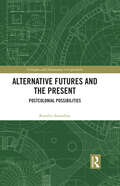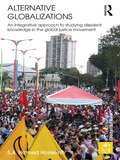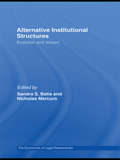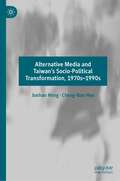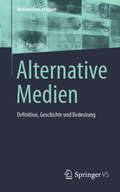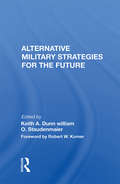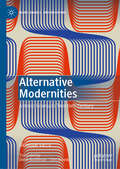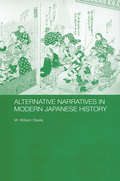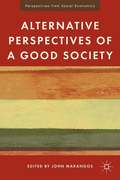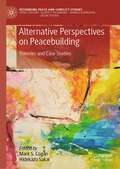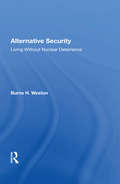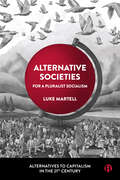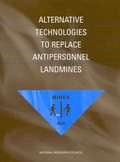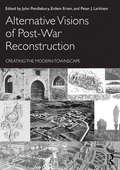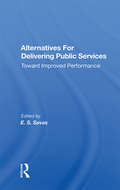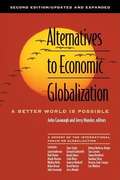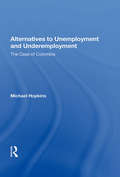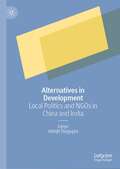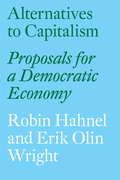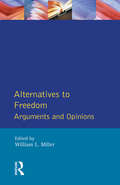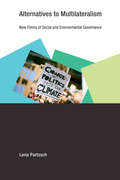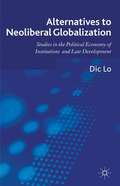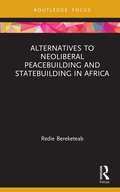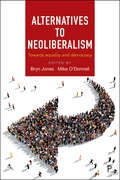- Table View
- List View
Alternative Futures and the Present: Postcolonial Possibilities (Critiques and Alternatives to Capitalism)
by Ranabir SamaddarThis book explores the idea that alternatives to our present condition are available in the present, such that a search for alternatives must involve rigorous study of some of its central texts, events, and thinkers. Through engagement with selected modern thinkers, texts, and events, it imagines a different future from the position of the current postcolonial moment, indicating the possibilities that emerge from the present and which shape contemporary radical thinking. An invitation to imagine a possible future marked with alternative possibilities of conducting struggles, and living through contentions and social restructuring, it will appeal to scholars with interests in social and political theory, political philosophy, colonialism and postcolonialism, and historical materialism.
Alternative Globalizations: An Integrative Approach to Studying Dissident Knowledge in the Global Justice Movement (Rethinking Globalizations)
by S. A. HosseiniAre the growing oppositions to neoliberal market globalism (especially in the aftermath of global economic meltdown) able to develop meaningful alternative ideologies? Is there any substantial alternative to the world capitalist system on the horizon? How would the ideologies and ideas address the dire dilemmas of economy vs. ecology, redistribution vs. recognition, global vs. local, reform vs. revolution etc.? This book answers such important questions by examining the intellectual structure of the so-called ‘anti-globalization’ or ‘global justice’ movement. It explores the formation and transformation of ideas, identities, and solidarities in the movement. The book also develops an analytical model to explain the movement’s ideational novelties and continuities in terms of both activist social experiences and global social changes. Hosseini develops new sociological concepts, integrates opposing theoretical perspectives into one approach, and addresses the gap between critical theories and activist practices. Through this endeavor, he discovers an emerging mode of consciousness which is characterized by its cross-identity and cross-ideological nature. This is a live but quiet global revolution. Drawing on a variety of disciplines, this gourd-breaking volume will be of interest to students and scholars of global studies, political sciences, sociology and social movement studies.
Alternative Institutional Structures: Evolution and impact (The\economics Of Legal Relationships Ser.)
by Nicholas Mercuro Sandra S. BatieIn the spring on 2006, a workshop was held at Michigan State University to honour the career of A. Allan Schmid and his writings about how institutions evolve and how alternative institutions, including property rights, shape political relationships and impact economic performance. This edited book is the outcome of the workshop. It is a collection
Alternative Media and Taiwan’s Socio-Political Transformation, 1970s–1990s
by Junhao Hong Cheng-Nan HouThis book systematically and comprehensively studies on alternative media in Taiwan, using a historical approach and primary data and first hand collected materials to examine how political openness and social movement in the 1980s through the 1990s in Taiwan enabled the rapid growth and wide development of Taiwan’s alternative media, what impact the alternative media in Taiwan had on its socio-political transformation, and what implications Taiwan’s case of alternative media has for other societies, especially for other Asian societies. This book would be a good reading for intellectuals, media professionals, government analysts, and the general public as well, who are interested in this topic.
Alternative Medien: Definition, Geschichte und Bedeutung (Medienwissen kompakt)
by Luis PaulitschDer vorliegende Band befasst sich mit der Definition, Geschichte und Bedeutung alternativer Medien für die Gesellschaft. Dabei wird insbesondere den folgenden Fragen nachgegangen: Wie gelingt eine Abgrenzung zu etablierten Medien? Welche Rolle spielen alternative Medien beim Aufstieg des Rechtspopulismus? Und sind sie Ausdruck einer pluralistischen Medienlandschaft oder gefährden sie womöglich die Demokratie?
Alternative Military Strategies For The Future
by Keith A. DunnIn this volume, prominent civilian and military experts in defense, representing the maritime-continental coalition, military reform, and noninterventionist schools of thought, outline the changes in military strategy, policy, and force structure that they believe the United States must adopt if it is to cope successfully with threats to national security in the 1980s and 1990s. The authors analyze US interests and objectives, the changing strategic environment, and the major security threats facing the United States in the coming decades. They also discuss what they believe is the proper mix of political, economic, and military instruments for dealing with fixture threats. The alternative strategies they present are wide-ranging and comprehensive, running the gamut from a strategic withdrawal from global commitments to proposals for increasing US power projection and forcible entry capabilities in the Third World. In many ways the chapters are critical of current and past approaches to military strategy. The authors believe it is essential that strategists understand the existing critiques of current U.S. military strategy in order to make the correct policy decisions for the future.
Alternative Modernities: Antonio Gramsci's Twentieth Century (Marx, Engels, and Marxisms)
by Giuseppe VaccaAntonio Gramsci lived the Great War as a “historic break,” a profound experience that left an indelible mark on the development of his political thought. Translated into English for the first time, Alternative Modernities reconstructs and analyses this critical period of Gramsci’s intellectual formation through a systematic analysis of his writings from 1915 to 1935. For Gramsci, Soviet Communism, “Americanism,” and the “new” Fascist State were the principle responses to the crisis of the old world order. He portrayed them as the three protagonists of twentieth-century modernity, alternatives destined to tragically clash in the worldwide struggle for hegemony. Among the arguments in his Prison Notebooks, Gramsci casts doubt on the political strategy of Soviet Communism and the theoretical underpinnings of “official Marxism.” Instead, he suggests a radical revision of Marxism by breathing life into a new interpretation whose fundamental concepts are: politics as the struggle for hegemony, the “passive revolution” as a historical paradigm of modernity, and the philosophy of praxis as the welding between visions of the worlds, historical analyses, and political strategies. Gramsci’s intuitions culminate in a new theory of the political subject, supported by a reflection upon the 20th century that still speaks to us today, pointing the way toward a new narrative of world history.
Alternative Narratives in Modern Japanese History
by M. William SteeleHow did ordinary people experience Japan's modern transformation? What role did people in local areas play in the making of modern Japan? How do studies of local politics help explain national events?The dominant account of modern Japanese history focuses on the nation-building that brought Japan into the modern world. After centuries of isolation, American warships forced Japan to open its doors to the West and a group of tough new leaders transformed the country into one of the great military and economic powers of the world. But different perspectives need to be examined. Alternative Narratives introduces other actors, other places and other dimensions of social and political activity in an attempt to construct a broader and more complex account of modern Japanese history.Focusing on the initial years of Japan's modern transformation, from the 1850s to the 1890s, Steele explores responses of commoners to the arrival of American warships in 1853; the growth of popular political consciousness; reactions of the residents of Edo in 1868 on the deposition of the shogun; responses of the village elite to the fall of the old regime; and established frameworks of historical narration - including American attempts to understand Japan's 1868 civil war.The author draws upon a wealth of documents, including broadsheets, woodblock prints, political cartoons and local campaign literature, as well as more conventional material in an endeavour to find new and different ways to examine the past. This book forms an important resource to students of Japanese history and culture while simultaneously appealing to scholars interested in the general problem of history and history-writing.
Alternative Perspectives Of a Good Society
by John MarangosAs a collection of alternative views on societies, methodologies, policies and assessment of the current elements of the society, Alternative Perspectives on a Good Society brings together different authors answering different questions all within the context of visions of a good society.
Alternative Perspectives on Peacebuilding: Theories and Case Studies (Rethinking Peace and Conflict Studies)
by Hidekazu Sakai Mark S. CoganThis book analyses and furthers the academic debates on post-liberal peacebuilding, through a number of conceptual, theoretical and empirical research outputs. Part I includes a review of how the recent discourse on peacebuilding has evolved, and three conceptual/theoretical perspectives relevant to post-liberal peacebuilding. In particular, the editors propose the concept of bespoke peacebuilding to articulate key features of new peacebuilding models. Part II introduces five case studies that present how alternative peacebuilding models are being shaped (or can be shaped) in practice. Essential reading for scholars and students in Peace and Conflict Studies, International Relations, and International Security Studies. Chapter 8 is available open access under a Creative Commons Attribution 4.0 International License via link.springer.com.
Alternative Security: Living Without Nuclear Deterrence
by Burns H WestonAlternative Security offers the thinking person a place to begin to kick the “nuclear habit.” Even as it accepts the premise that war is endemic to the human condition, it provides reassurance that an other-than-nuclear deterrence policy can work to effectively safeguard national and transnational interests. These eight original essays, acco
Alternative Societies: For a Pluralist Socialism
by Luke MartellIn a time of great gloom and doom internationally and of major global problems, this book offers an invaluable contribution to our understanding of alternative societies that could be better for humans and the environment. Bringing together a wide range of approaches and new strands of economic and social thinking from across the US, Mexico, Latin America, Europe, Asia, Middle East and Africa, Luke Martell critically assesses contemporary alternatives and shows the ways forward with a convincing argument of pluralist socialism. Presenting a much-needed introduction to the debate on alternatives to capitalism, this ambitious book is not about how things are but how they can be!
Alternative Technologies To Replace Antipersonnel Landmines
by National Research CouncilThe US Congress mandated the Department of Defense to investigate whether there were technological, tactical, or operational alternatives to landmines designed to kill or maim individuals. The Department commissioned the National Research Council. The committee reports that no simple device now available can do so, but that devices under development, along with carefully planned tactics and appropriate operational procedures might serve the same function. There is no index. Annotation copyrighted by Book News, Inc. , Portland, OR.
Alternative Visions of Post-War Reconstruction: Creating the modern townscape
by John Pendlebury Erdem Erten Larkham J PeterThe history of post Second World War reconstruction has recently become an important field of research around the world; Alternative Visions of Post-War Reconstruction is a provocative work that questions the orthodoxies of twentieth century design history. This book provides a key critical statement on mid-twentieth century urban design and city planning, focused principally upon the period between the start of the Second World War to the mid-sixties. The various figures and currents covered here represent a largely overlooked field within the history of 20th century urbanism. In this period while certain modernist practices assumed an institutional role for post-war reconstruction and flourished into the mainstream, such practices also faced opposition and criticism leading to the production of alternative visions and strategies. Spanning from a historically-informed modernism to the increasing presence of urban conservation the contributors examine these alternative approaches to the city and its architecture.
Alternatives For Delivering Public Services: Toward Improved Performance
by Emanuel S. SavasThis book is the result of a program undertaken nine years ago by the Diebold Institute for Public Policy Studies, Inc., to identify and analyze potentials for private sector involvement in the delivery of public services. Since its founding in 1968, the Diebold Institute has focused on this question in the belief that private enterprise is capable of infusing public service delivery with the efficiency in resource allocation and management that is its hallmark, whether through direct involvement as a service provider or as a source of market dynamics and management techniques.
Alternatives To Economic Globalization
by The Editors of the International Forum on Globalizationargues that the current model of economy is both unjust and unsustainable and presents alternatives
Alternatives To Unemployment And Underemployment: The Case Of Colombia
by Michael HopkinsThe creation of jobs is critical in Third World countries where growing populations face unemployment or inadequate employment. Many have put forth theories and suggestions that address this problem, but there has been insufficient empirical analysis of the effects of specific policies on employment growth. The author examines macroeconomic theories of labour market behavior and labour force definitions and concepts, assessing how productive they are in formulating employment strategies for Colombia. The implications of a range of alternative policies for generating jobs, their effectiveness in reducing unemployment, and possible programs for the future are analyzed.
Alternatives in Development: Local Politics and NGOs in China and India
by Abhijit Dasgupta LiyiyuThis book deals with the dynamics of local-level politics in China and India. China introduced new policies to restructure local politics in 1978. In place of communes, civil society organizations and cooperatives were introduced in villages. More changes came about with the introduction of the Organic Law of the Villagers' Committees of the People's Republic of China in 1998. The new local power structure includes state-sponsored institutions like Villagers Committees and the traditional civil society organizations (CSOs) and non-government organizations (NGOs). As in China, local politics in India undergoes considerable changes during the last few decades. Panchayati Raj Institutions (PRIs) were reformed in 1992 with a constitutional amendment act. CSOs and NGOs were allowed to function. Against this background, the present book is undertaken with the objectives first, to present two different models of local politics and second, to compare the two, finally to focus on the two different models of development. This book will interest scholars of rural governance, rural transformation, and the role of the grassroots CSOs and NGOs in shaping development program and growth in the two large countries in Asia.
Alternatives in Mobilization: Ethnicity, Religion, and Political Conflict
by Jóhanna Kristín Birnir Nil Seda ŞatanaWhat determines which identity cleavage, ethnicity or religion, is mobilized in political contestation, be it peaceful or violent? In contrast to common predictions that the greatest contention occurs where identities are fully segmented, most identity conflicts in the world are between ethnic groups that share religion. Alternatives in Mobilization builds on the literature about political demography to address this seeming contradiction. The book proposes that variation in relative group size and intersection of cleavages help explain conundrums in the mobilization of identity, across transgressive and contained political settings. This theory is tested cross-nationally on identity mobilization in civil war and across violent conflict in Pakistan, Uganda, Nepal and Turkey, and peaceful electoral politics in Indonesia. This book helps illustrate a more accurate and improved picture of the ethnic and religious tapestry of the world and addresses an increasing need for a better understanding of how religion contributes to conflict.
Alternatives to Capitalism: Proposals for a Democratic Economy
by Erik Olin Wright Robin HahnelWhat would a viable free and democratic society look like? Poverty, exploitation, instability, hierarchy, subordination, environmental exhaustion, radical inequalities of wealth and power--it is not difficult to list capitalism's myriad injustices. But is there a preferable and workable alternative? Alternatives to Capitalism: Proposals for a Democratic Economy presents a debate between two such possibilities: Robin Hahnel's "participatory economics" and Erik Olin Wright's "real utopian" socialism. It is a detailed and rewarding discussion that illuminates a range of issues and dilemmas of crucial importance to any serious effort to build a better world.From the Trade Paperback edition.
Alternatives to Freedom: Arguments and Opinions
by William L. MillerThis authoritative text concerns itself with freedom and `alternatives to freedom', based on original survey research of public attitudes to civil and political rights.It combines and connects explicit and implicit arguments for freedom, with the judgements of public opinion on two levels the general public and politicians encouraging the reader to think about issues both in terms of political theory and public opinion.The issues considered, all of which may be viewed as alternatives to the narrow conception of freedom as the absence of coercion, are:* parliamentary sovereignty* the national interest* responsibility* accountability* equality* the moral communityAlternate chapters present powerful arguments from political figures such as Lord Armstrong, Lord Jenkins and Roy Hattersley, based on practical experience, and then assess public opinion for each issue.
Alternatives to Multilateralism: New Forms of Social and Environmental Governance (Earth System Governance)
by Lena PartzschAnalysis and case studies of emerging forms of private, public, and hybrid social and environmental governance.The effects of globalization on governance are complex and uncertain. As markets integrate, governments have become increasingly hesitant to enforce regulations inside their own jurisdictions. At the same time, multilateralism has proven unsuccessful in coordinating states' responses to global challenges. In this book, Lena Partzsch describes alternatives to multilateralism, offering analyses and case studies of emerging--alternative--forms of private, public, and hybrid social and environmental regulation. In doing so, she offers a unique overview of cutting-edge approaches to global governance.
Alternatives to Neoliberal Globalization
by Dic LoThrough a compliance with the neoliberal doctrines associated with the Washington Consensus, and the corresponding emphasis on the privitization of public assets, the promotion of well-defined property rights and a focus on price and trade liberalisation, developing countries have been promised that 'natural economic institutions' will form. However, despite the promotion of these doctrines, the 1980s and 1990s have come to be known as the 'lost decades of development': a period of long economic stagnation in most parts of the developing world, with little sign of the income level of the developing world converging with that of developed countries. In this book, Dic Lo re-examines the mainstream policy doctrines of globalization, and formulates explanations for the uneven development of recent years. Through a comparative analysis of the actual experiences of developing nations and their policy positions, this book clarifies the positive and negative lessons that can be learned by developing countries. Dic Lo also undertakes an examination of the theoretical underpinnings of the competing doctrines of institutions and development, with a view to creating a synthesis that transcends neoliberalism, instead emphasising solidarity and humanistic development.
Alternatives to Neoliberal Peacebuilding and Statebuilding in Africa (Routledge Studies in African Development)
by Redie BereketeabThis book critically interrogates the neoliberal peacebuilding and statebuilding model and proposes a popular progressive model centred around the lived realities of African societies. The neoliberal interventionist model assumed prominence and universal hegemony following the demise of state socialism at the end of the Cold War. However, this book argues that it is a primarily short-term, top-down approach that imposes Western norms and values on conflict and post-conflict societies. By contrast, the popular progressive model espoused by this book is based on stringent examination and analysis of the reality of the socio-economic development, structures, institutions, politics and cultures of developing societies. In doing so, it combines bottom-up and top-down, popular and elite, and long-term evolutionary processes of societal construction as a requisite for enduring peacebuilding and statebuilding. By comparing and contrasting the dominant neoliberal peacebuilding and statebuilding model with a popular progressive model, the book seeks to empower locals (both elites and masses) to sit in the driver’s seat and construct their own societies. As such, it is an important contribution to scholars, activists, policymakers, civil society organisations, NGOs and all those who are concerned with peace, stability and development across Africa and other developing countries.
Alternatives to Neoliberalism: Towards Equality and Democracy
by Bryn Jones and Mike O’DonnellIn this collection, innovative and eminent social and policy analysts, including Colin Crouch, Anna Coote, Grahame Thompson and Ted Benton, challenge the failing but still dominant ideology and policies of neo-liberalism. The editors synthesise contributors’ ideas into a revised framework for social democracy; rooted in feminism, environmentalism, democratic equality and market accountability to civil society. This constructive and stimulating collection will be invaluable for those teaching, studying and campaigning for transformative political, economic and social policies.
